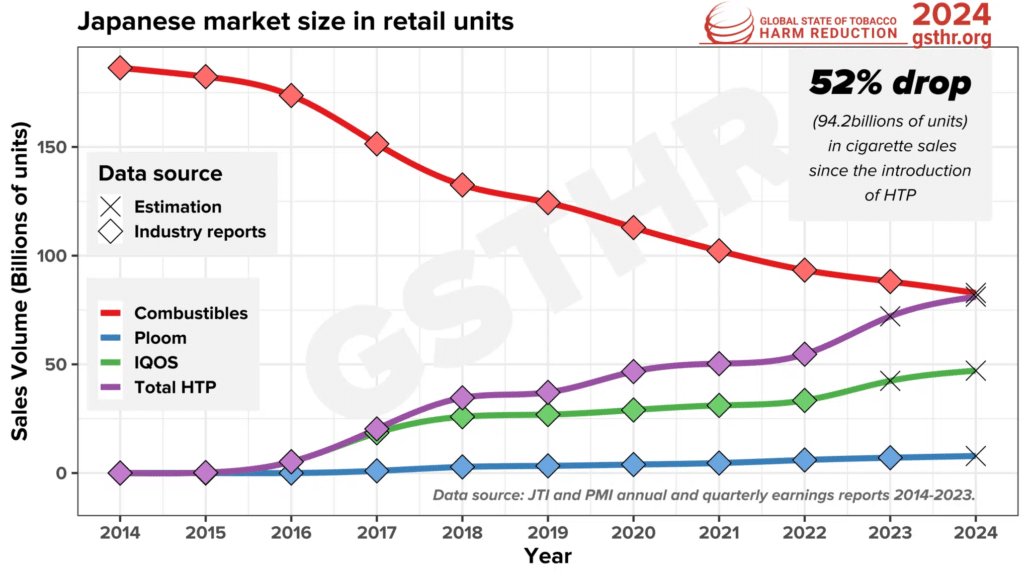In the past decade, Japan has experienced a notable reduction in cigarette sales, which have decreased by 52%. This significant change coincides with the introduction and adoption of heated tobacco products (HTPs).
This phenomenon has been thoroughly explored in the latest Global State of Tobacco Harm Reduction (GSTHR) document, titled “Cigarette Sales Halved: Heated Tobacco Products and the Japanese Experience.” This report, prepared by Knowledge·Action·Change (K·A·C), a UK-based public health agency, highlights how HTPs have gained traction as less harmful alternatives to traditional tobacco.
The success of HTPs in Japan is attributed to technological innovation and a marked concern for personal and collective health. Japan is distinguished by its receptivity to new technologies, facilitating the transition to alternative tobacco products.

However, it is necessary to highlight that the popularity of HTPs has also been favored by the absence of competition from other safer nicotine products, such as nicotine vapes and nicotine pouches, which are not legally available in the Japanese market.
Using publicly accessible market data, it was observed that individual cigarette sales plummeted from 182.34 billion units in 2015 to 88.1 billion in 2023, a 52% decrease.
Simultaneously, sales of tobacco units used in HTPs increased to 62 billion in less than a decade. This shift not only reflects a direct substitution but also a phenomenon of dual use, where many smokers do not entirely abandon cigarettes but alternate between products.
The success of HTPs in Japan offers significant hope for reducing cigarette sales in other countries with similar characteristics. Notably, this public health success story has occurred without substantial action or endorsement by the Japanese government. Although politicians have allowed the availability of HTPs, these products are regulated similarly to combustible cigarettes in terms of use in public places, though they are subject to lower taxes.
David MacKintosh, director of K·A·C, emphasizes that Japan’s rapid and extensive change demonstrates how things can improve when nicotine consumers are offered a safer alternative. “This is not the result of specific government policy; however, the benefits for individuals and society are significant. There are lessons to be learned from Japan for all who wish to see the use of combustible tobacco relegated to the history books. Harm reduction is about giving people the opportunity to improve their health and the health of those around them. Given the chance, most people will do just that.”
This GSTHR analysis not only highlights the potential of heated tobacco products in reducing cigarette consumption but also underscores the importance of public health policies that facilitate safer and more effective alternatives for nicotine consumers.
The Global State of Tobacco Harm Reduction (GSTHR) is a project managed by Knowledge·Action·Change. This organization promotes harm reduction worldwide as a vital public health strategy grounded in human rights.
With decades of experience in harm reduction across areas such as drug use, HIV, smoking, sexual health, and prison environments, K·A·C maps the development of tobacco harm reduction, as well as the use, availability, and regulatory response to safer nicotine products, along with the prevalence of smoking and related mortality, in over 200 countries and regions around the world.
The GSTHR, led by Harry Shapiro, produces reports and collects real-time data, which are available on its website, gsthr.org. These reports are funded by a grant from Global Action to End Smoking (formerly known as the Foundation for a Smoke-Free World), an independent non-profit organization in the U.S. that accelerates science-based efforts globally to end the smoking epidemic.

